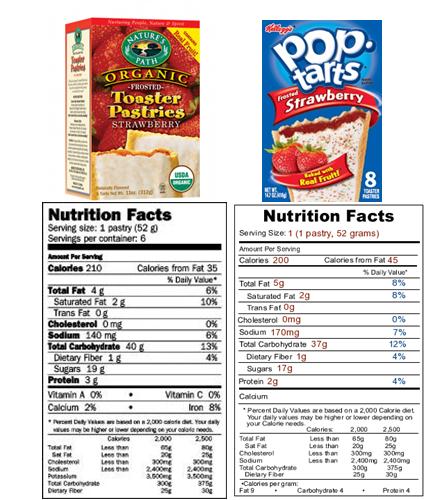Organic Junk Food is Healthier !?
When it comes to health halos, arguably the biggest one is “Organic”. Please don’t get us wrong, the organic food movement is fantastic, and eating organic food has a multitude of benefits – health, social, and ecological. However, the term “organic” has been hijacked by the processed food industry to the point where junk food is deemed healthful simply because it is organic.
Don’t believe us?
Check out an experiment carried out at Cornell University by graduate student Jenny Wan-chen, who discovered that
…cookies and chips have fewer calories, less fat and more fiber when they are organic.
She discovered this myth when she offered 144 mall shoppers samples of yogurt, chips and chocolate sandwich cookies. Each shopper was given two samples of each food — one that was supposedly organic and one that was allegedly of the conventional variety. After tasting the food pairs, the shoppers were asked to score both samples on a 9-point scale for qualities including taste and fat content. Wan-chen also asked the shoppers to estimate how many calories were in each food.
Overall, shoppers consistently said the organic foods were tastier. They also estimated that the organic foods had more fiber, less fat and fewer calories. They even said they’d be willing to pay more for the “organic” snacks than the “regular” ones. Read more from the Los Angeles Times…
What you need to know:
“Organic” slapped on a processed food product does not immediately imply “healthy”. Take Health Valley Organic for example. They make products such as the Organic Multigrain Strawberry Cobbler Cereal Bars.
Here is the ingredient list:
Strawberry filling (organic cane juice, organic apple powder, organic strawberries, organic rice starch, natural flavor, pectin, citric acid, red cabbage extract for color), organic flours (organic wheat, organic oat, organic corn), organic cane juice, organic expeller pressed canola oil and/or sunflower oil and/or safflower oil, organic oat fiber, organic wheat bran, organic wheat gluten, organic inulin, natural flavors, organic honey, organic nonfat dry milk, organic butter flavor, cream of tartar, baking soda, organic acacia gum, soy lecithin, sea salt.
The pros:
no artificial colorings
No trans-fats
The cons:
Mostly added sugar – 4 teaspoons per bar. Organic Cane Juice is a fancy name for sugar.
refined flours provide very little fiber
The fiber is added using inulin
I was happy to see this article as it’s bothersome to see people change their diets by choosing something "healthier" like Nature’s Path Toaster Pastries over the Kellogg’s Pop-tarts. Sure, the ingredients are cleaner and definitely the lesser evil when comparing the two, but as seen below, the nutrition facts are still similar.

I understand people can eat what and when they want, but many are trying to make a change for the good and are being misled by these Organic processed foods. Organic is not the end all be all way for nutrition! A conventional apple would still be the more nutritional choice over organic apple crisps.
Speaking of fruit, there are some types of produce you can get away with buying conventional and save money in the process.
Here’s a list of 15 produce items that are lower in pesticides and therefore safer to buy non-organic:
1. Onions
2. Avocado
3. Sweet corn
4. Pineapple
5. Mangos
6. Sweet peas
7. Asparagus
8. Kiwi
9. Cabbage
10. Eggplant
11. Cantaloupe
12. Watermelon
13. Grapefruit
14. Sweet potato
15. Honeydew melon
Download a pocket version or iPhone app of the foods to buy and not buy organic here.
Getting back to processed foods, forget what the front of the package says and go directly to the ingredients to see if it’s worth buying. Organic or not, sugar is sugar and it carries little, if any nutritional value. If you must get your sweet fix, I would suggest honey as it has the most to offer along with its sweetness.
Look out for some of these ingredients when deciding on a packaged food to help make more informed decisions:
1. Partially Hydrogenated Oils (aka Trans Fats): These are abundant in most processed, packaged food and fast food. Hydrogenated fats keep these foods stable and extend their shelf-life to longer than a natural food would have. Yeah, great, but what you get as a result is inflammation, impaired immunity, arthritis, cancer, heart disease, high blood pressure, obesity, liver damage, and the list of risks go on and on.
2. Natural Sweeteners: If you see sugar as one of the top three on the list, chances are there’s a lot of it since ingredients are listed by volume in products. Be weary of the many names sugar has on labels too! Some of the common names are barley malt, corn syrup, dextrose, fruit juice concentrate, glucose, high-fructose corn syrup, maltodextrin, maltose, molasses, raw sugar, sucrose, and turbinado sugar. Go here for a full list of 69 different names for sugar.
3. Artificial Sweeteners: Chemical sweeteners like aspartame, Splenda / sucralose (yellow packet), Sweet’N Low (pink packet), and Equal (blue packet) are hundreds of times sweeter than sugar. Like sugar, they make things sweet and offer no nutritional value. You would be surprised at how many items have these added, with low calorie diet foods being the main culprit. Major side effects from artificial sweeteners include bloating, seizures, cancer, increased cravings, headaches, skin conditions, weight gain, and even Alzheimer’s disease. To enjoy a sweet taste without the added calories and side effects, try using stevia in powder or liquid form.
 4. Enriched Flours: These are a result of processing a grain into flour and stripping it of the germ and bran; the parts that contain most of the nutrients. The flour is then “enriched” by companies adding a small amount of vitamins and minerals back in to the product. Enriched flour is similar to sugar in that it has a low nutritive value and is essentially an empty carbohydrate. Don’t believe the front of the package claiming “Made With Whole Grains,” as that just means whole grains are somewhere in the product. Make sure to scrutinize the ingredients label and look for the whole grains listed at the top. A good check is to look at the fiber content; if is low or <1, whole grains are not present. As seen above in toaster pastry labels, neither have enough fiber to sneeze at.
4. Enriched Flours: These are a result of processing a grain into flour and stripping it of the germ and bran; the parts that contain most of the nutrients. The flour is then “enriched” by companies adding a small amount of vitamins and minerals back in to the product. Enriched flour is similar to sugar in that it has a low nutritive value and is essentially an empty carbohydrate. Don’t believe the front of the package claiming “Made With Whole Grains,” as that just means whole grains are somewhere in the product. Make sure to scrutinize the ingredients label and look for the whole grains listed at the top. A good check is to look at the fiber content; if is low or <1, whole grains are not present. As seen above in toaster pastry labels, neither have enough fiber to sneeze at.
There are many other ingredients that are ill-advised on actually ingesting, but these seem to be the most common. The best way to avoid harmful ingredients is to consume whole, unprocessed foods like those found around the perimeter of the grocery store.
What do you do to steer clear of harmful ingredients? Post your ideas to the comments section to share your ideas.







No comments:
Post a Comment